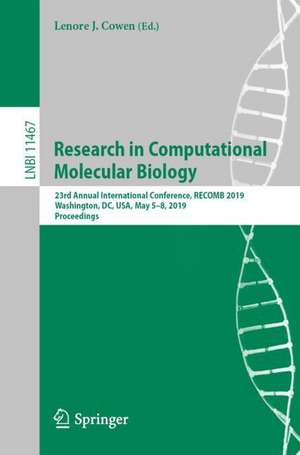Research in Computational Molecular Biology: 23rd Annual International Conference, RECOMB 2019, Washington, DC, USA, May 5-8, 2019, Proceedings: Lecture Notes in Computer Science, cartea 11467
Editat de Lenore J. Cowenen Limba Engleză Paperback – 2 apr 2019
The 17 extended and 20 short abstracts presented were carefully reviewed and selected from 175 submissions. The short abstracts are included in the back matter of the volume. The papers report on original research in all areas of computational molecular biology and bioinformatics.
Din seria Lecture Notes in Computer Science
- 20%
 Preț: 1061.55 lei
Preț: 1061.55 lei - 20%
 Preț: 307.71 lei
Preț: 307.71 lei - 20%
 Preț: 438.69 lei
Preț: 438.69 lei - 20%
 Preț: 579.30 lei
Preț: 579.30 lei -
 Preț: 410.88 lei
Preț: 410.88 lei - 17%
 Preț: 427.22 lei
Preț: 427.22 lei - 20%
 Preț: 596.46 lei
Preț: 596.46 lei - 15%
 Preț: 448.04 lei
Preț: 448.04 lei - 20%
 Preț: 353.50 lei
Preț: 353.50 lei -
 Preț: 389.49 lei
Preț: 389.49 lei - 20%
 Preț: 309.90 lei
Preț: 309.90 lei - 20%
 Preț: 645.28 lei
Preț: 645.28 lei - 20%
 Preț: 763.23 lei
Preț: 763.23 lei - 15%
 Preț: 580.46 lei
Preț: 580.46 lei - 20%
 Preț: 310.28 lei
Preț: 310.28 lei - 20%
 Preț: 655.02 lei
Preț: 655.02 lei - 20%
 Preț: 1183.14 lei
Preț: 1183.14 lei - 20%
 Preț: 340.32 lei
Preț: 340.32 lei -
 Preț: 449.57 lei
Preț: 449.57 lei - 20%
 Preț: 591.51 lei
Preț: 591.51 lei - 18%
 Preț: 938.83 lei
Preț: 938.83 lei - 20%
 Preț: 337.00 lei
Preț: 337.00 lei - 20%
 Preț: 649.50 lei
Preț: 649.50 lei - 20%
 Preț: 607.40 lei
Preț: 607.40 lei - 20%
 Preț: 1414.79 lei
Preț: 1414.79 lei - 20%
 Preț: 1024.44 lei
Preț: 1024.44 lei - 20%
 Preț: 583.40 lei
Preț: 583.40 lei - 20%
 Preț: 453.32 lei
Preț: 453.32 lei - 20%
 Preț: 575.49 lei
Preț: 575.49 lei - 20%
 Preț: 1075.26 lei
Preț: 1075.26 lei - 20%
 Preț: 585.88 lei
Preț: 585.88 lei - 20%
 Preț: 825.93 lei
Preț: 825.93 lei - 17%
 Preț: 360.20 lei
Preț: 360.20 lei - 20%
 Preț: 763.23 lei
Preț: 763.23 lei - 20%
 Preț: 340.32 lei
Preț: 340.32 lei - 20%
 Preț: 504.58 lei
Preț: 504.58 lei - 20%
 Preț: 369.13 lei
Preț: 369.13 lei - 20%
 Preț: 580.93 lei
Preț: 580.93 lei - 20%
 Preț: 343.62 lei
Preț: 343.62 lei - 20%
 Preț: 350.21 lei
Preț: 350.21 lei - 20%
 Preț: 583.40 lei
Preț: 583.40 lei - 20%
 Preț: 583.40 lei
Preț: 583.40 lei - 15%
 Preț: 438.59 lei
Preț: 438.59 lei - 20%
 Preț: 341.95 lei
Preț: 341.95 lei - 20%
 Preț: 238.01 lei
Preț: 238.01 lei - 20%
 Preț: 538.30 lei
Preț: 538.30 lei
Preț: 445.58 lei
Preț vechi: 524.21 lei
-15% Nou
Puncte Express: 668
Preț estimativ în valută:
85.27€ • 88.70$ • 70.40£
85.27€ • 88.70$ • 70.40£
Carte tipărită la comandă
Livrare economică 14-28 aprilie
Preluare comenzi: 021 569.72.76
Specificații
ISBN-13: 9783030170820
ISBN-10: 3030170829
Pagini: 317
Ilustrații: XIV, 337 p. 146 illus., 67 illus. in color.
Dimensiuni: 155 x 235 mm
Greutate: 0.49 kg
Ediția:1st ed. 2019
Editura: Springer International Publishing
Colecția Springer
Seriile Lecture Notes in Computer Science, Lecture Notes in Bioinformatics
Locul publicării:Cham, Switzerland
ISBN-10: 3030170829
Pagini: 317
Ilustrații: XIV, 337 p. 146 illus., 67 illus. in color.
Dimensiuni: 155 x 235 mm
Greutate: 0.49 kg
Ediția:1st ed. 2019
Editura: Springer International Publishing
Colecția Springer
Seriile Lecture Notes in Computer Science, Lecture Notes in Bioinformatics
Locul publicării:Cham, Switzerland
Cuprins
An Efficient, Scalable and Exact Representation of High-Dimensional Color Information Enabled Via de Bruijn Graph Search.- Identifying Clinical Terms in Free-Text Notes Using Ontology-Guided Machine Learning.- ModHMM: A Modular Supra-Bayesian Genome Segmentation Method.- Learning Robust Multi-Label Sample Specific Distances for Identifying HIV-1 Drug Resistance.- MethCP: Differentially Methylated Region Detection with Change Point Models.- On the Complexity of Sequence to Graph Alignment.- Minimization-Aware Recursive K* (MARK*): A Novel, Provable Algorithm that Accelerates Ensemble-based Protein Design and Provably Approximates the Energy Landscape.- Sparse Binary Relation Representations for Genome Graph Annotation.- How Many Subpopulations is Too Many? Exponential Lower Bounds for Inferring Population Histories.- Efficient Construction of a Complete Index for Pan-Genomics Read Alignment.- Tumor Copy Number Deconvolution Integrating Bulk and Single-CellSequencing Data.- OMGS: Optical Map-based Genome Scaffolding.- Fast Approximation of Frequent k-mers and Applications to Metagenomics.- De Novo Clustering of Long-Read Transcriptome Data Using a Greedy, Quality-Value Based Algorithm.- A Sticky Multinomial Mixture Model of Strand-Coordinated Mutational Processes in Cancer.- Disentangled Representations of Cellular Identity.- RENET: A Deep Learning Approach for Extracting Gene-Disease Associations from Literature.- APPLES: Fast Distance Based Phylogenetic Placement.- De Novo Peptide Sequencing Reveals a Vast Cyclopeptidome in Human Gut and Other environments.- Biological Sequence Modeling with Convolutional Kernel Networks.- Dynamic Pseudo-Time Warping of Complex Single-Cell Trajectories.- netNMF-sc: A Network Regularization Algorithm for Dimensionality Reduction and Imputation of Single-Cell Expression Data.- Geometric Sketching of Single-Cell Data Preserves Transcriptional Structure.- Sketching Algorithms for GenomicData Analysis and Querying in a Secure Enclave.- Mitigating Data Scarcity in Protein Binding Prediction Using Meta-Learning.- Efficient Estimation and Applications of Cross-Validated Genetic Predictions.- Inferring Tumor Evolution from Longitudinal Samples.- Scalable Multi-Component Linear Mixed Models with Application to SNP Heritability Estimation.- A Note on Computing Interval Overlap Statistics.- Distinguishing Biological from Technical Sources of Variation by Leveraging Multiple Methylation Datasets.- GRep: Gene Set Representation via Gaussian Embedding.- Accurate Sub-Population Detection and Mapping Across Single Cell Experiments with PopCorn.- Fast Estimation of Genetic Correlation for Biobank-Scale Data.- Distance-Based Protein Folding Powered by Deep Learning.- Comparing 3D Genome Organization in Multiple Species Using Phylo-HMRF.- Towards a Post-Clustering Test for Didderential Expression.- AdaFDR: a Fast, Powerful and Covariate-Adaptive Approach for Multiple Hypothesis Testing.
